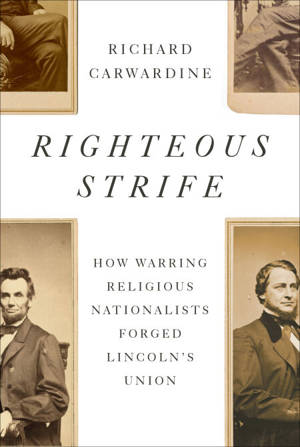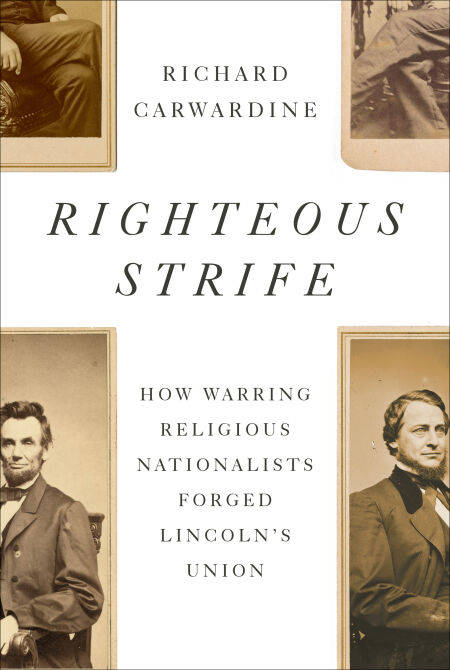
- Afhalen na 1 uur in een winkel met voorraad
- Gratis thuislevering in België vanaf € 30
- Ruim aanbod met 7 miljoen producten
- Afhalen na 1 uur in een winkel met voorraad
- Gratis thuislevering in België vanaf € 30
- Ruim aanbod met 7 miljoen producten
Righteous Strife E-BOOK
How Warring Religious Nationalists Forged Lincoln's Union
Richard Carwardine
E-book | Engels
€ 13,88
+ 13 punten
Omschrijving
The first major account of the American Civil War to give full weight to the central role played by religion, reframing the conflict through Abraham Lincoln’s contentious appeals to faith-based nationalism
How did slavery figure in God’s plan? Was it the providential role of government to abolish this sin and build a righteous nation? Or did such a mission amount to “religious tyranny” and “pulpit politics,” in an effort to strip the southern states of their God-given rights? In 1861, in an already fracturing nation, the tensions surrounding this moral quandary cracked the United States in half, and even formed rifts within the North itself, where antislavery religious nationalists butted heads with conservative religious nationalists over their visions for America’s future.
At the center of this melee stood Abraham Lincoln, who would turn to his own faith for guidance, proclaiming more days of national fasting and thanksgiving than any other president before or since. These pauses for spiritual reflection provided the inspirational rhetoric and ideological fuel that sustained the war.
In Righteous Strife, Richard Carwardine gives renewed attention to this crucible of contending religious nationalisms, out of which were forged emancipation, Lincoln’s reelection, and his second inaugural address. No understanding of the American Civil War is complete without accounting for this complex dance between church and state—one that continues to define our nation.
How did slavery figure in God’s plan? Was it the providential role of government to abolish this sin and build a righteous nation? Or did such a mission amount to “religious tyranny” and “pulpit politics,” in an effort to strip the southern states of their God-given rights? In 1861, in an already fracturing nation, the tensions surrounding this moral quandary cracked the United States in half, and even formed rifts within the North itself, where antislavery religious nationalists butted heads with conservative religious nationalists over their visions for America’s future.
At the center of this melee stood Abraham Lincoln, who would turn to his own faith for guidance, proclaiming more days of national fasting and thanksgiving than any other president before or since. These pauses for spiritual reflection provided the inspirational rhetoric and ideological fuel that sustained the war.
In Righteous Strife, Richard Carwardine gives renewed attention to this crucible of contending religious nationalisms, out of which were forged emancipation, Lincoln’s reelection, and his second inaugural address. No understanding of the American Civil War is complete without accounting for this complex dance between church and state—one that continues to define our nation.
Specificaties
Betrokkenen
- Auteur(s):
- Uitgeverij:
Inhoud
- Aantal bladzijden:
- 624
- Taal:
- Engels
Eigenschappen
- Productcode (EAN):
- 9780593802625
- Verschijningsdatum:
- 20/01/2025
- Uitvoering:
- E-book
- Beveiligd met:
- Adobe DRM
- Formaat:
- ePub

Alleen bij Standaard Boekhandel
+ 13 punten op je klantenkaart van Standaard Boekhandel
Beoordelingen
We publiceren alleen reviews die voldoen aan de voorwaarden voor reviews. Bekijk onze voorwaarden voor reviews.








